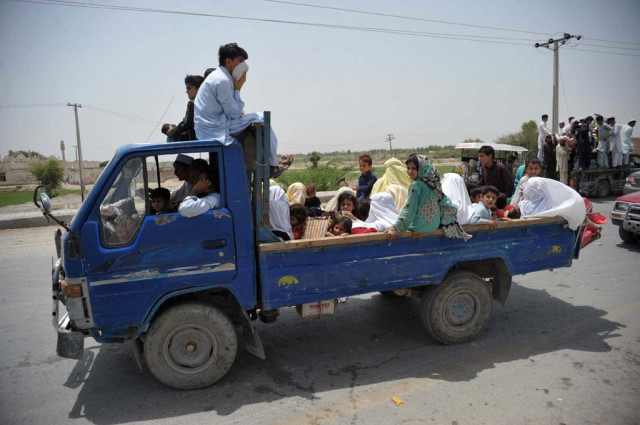A lasting peace: As locals flee N Waziristan, border town Wana thrives
Tribal elders, political administration and army reaffirm 2007 agreement.

Civilians fleeing from the operation in North Waziristan. PHOTO: AFP
While North Waziristan remains in the Pakistan army and media’s crosshairs following the announcement of Operation Zarb-e-Azb on Sunday this week, life in Wana, the main town of South Waziristan, bordering North Waziristan, continues as before. Locals here are not just surviving, but thriving.
On Wednesday, the fourth day of the operation, a jirga of tribal elders from the Ahmadzai tribe met with army and political administration officials to ensure a lasting peace in the area. On the same day, a cricket tournament kicked off in Doog village near Wana Bazaar, and teams from different parts of Wana threw themselves into the competition, even as just across the border, locals fled from North Waziristan in search of safety.
The jirga met with GOC-9-Div General Nadeem Raza and Assistant Political Agent Wana Shahid Ali in Wana Scouts Camp and reiterated a pledge to maintain peace in Wana as signatories to the 2007 peace agreement. The peace agreement, which has been vehemently criticised, was signed in 2007 between the Ahmadzais and the government. The accord is considered vital for maintaining peace in Wana sub-division. It ensures security to government property and machinery and makes the committee responsible for maintaining peace in accordance with tribal traditions.
All sides agreed to remain vigilant in order to curb the infiltration of suspected militants in South Waziristan from North Waziristan as Operation Zarb-e-Azb continues. “We will not allow anyone to disrupt peace in Wana,” said Malik Ajmal Khan of Kaka Khel tribe during the jirga. He requested that security on the Gomal Zam Road, which links Wana with DI Khan, should be tightened as travellers and drivers are frequently accosted here.
An official of the political administration confirmed that the jirga was held and added that tribal elders and Ulema meet frequently in order to maintain peace in the area. Tight security measures have been taken on all roads into Wana and no one is allowed to enter the town unless it is listed as a permanent address on their CNIC, the official said.
Additionally, security was enhanced at all check posts in the area, with FC personnel stationed here as opposed to the local khasadar force. On Wednesday, the previously closed Gomal Zam road was opened to traffic but security was tightened at the Gurda Wai check post located on Gonal Zam road and on the entrance to South Waziristan. FC personnel were also deployed at Gull Kuch check post in Toi Khulla on Wana-Zohb Road, the Shah Wall check post on the border with North Waziristan and the Angor Adda on the Afghan border with South Waziristan.
Wana is better than other areas in the Federally Administered Tribal Areas as there is no threat to education and government institutions here, said Malik Muhammad Ali of Tojai Khel during the jirga, adding that ensuring long-lasting peace is the responsibility of both the government and the Ahmedzai tribe. Due to the peace agreement, development work has continued at a faster pace here as compared with other parts of North and South Waziristan; Wana Cadet College, for instance, and other public and private schools are fully functional here. Schools remain open in Wana during Operation Zarb-e-Azb as opposed to others in FATA, closed down due to the operation.
Meanwhile, it is business as usual in all markets in Wana – bazaars including Azam Warsak, Shakai, Tanai, Kari Kot, Angor Adda and Wana Bazaar have stayed open during the military operation.
Published in The Express Tribune, June 20th, 2014.













COMMENTS
Comments are moderated and generally will be posted if they are on-topic and not abusive.
For more information, please see our Comments FAQ